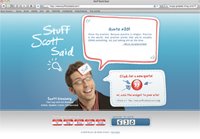
 Sometimes, it sucks being the youngest one in room.
Sometimes, it sucks being the youngest one in room.
And by “sometimes,” I mean, “every excruciating hour of your workday.”
Think about it:
Nobody takes you seriously.
The world refuses to listen to your voice.
And the people you work with are twice your age, have three times your knowledge and four times your experience.
What’s a kid to do?
Instead of going postal on your entire office with a semi-automatic machine gun (which isn’t as effective as it sounds, trust me) here’s a collection of strategies, practices and practical advice on making a name for yourself as a young professional:1. Build a timeline of credibility. I started my career as a writer and speaker when I was twenty-two. That meant standing in front of hundreds (sometimes thousands) of complete strangers – who had no logical reason to take me seriously.
Think about it: No advanced degrees. No real work experience. No amazing story of overcoming adversity. Just some dorky guy, standing on stage, wearing a nametag. Would you take me seriously? Hell no. And that was my deficit position. That’s what I had working against me.
Except for one thing: I did write a book.
Now, it wasn’t the best book. It wasn’t the best-selling book. But it was a still a book. And considering the fact that most people in the world have a book inside of them – but never get it out – I found myself in a potentially advantageous position.
That’s why I went out of my way to make sure that every single person knew about the book immediately: I told them personally, I asked other people to tell them personally, sometimes I even gave five hundred copies of my book to the entire audience. I didn’t care. Whatever it took. These people were going to recognize whatever slice of credibility I could serve up within thirty seconds. Period.
The cool part is: You don’t need a book to do this. Execution is the great qualifier. Your challenge is to represent whatever measurable successes you’ve achieved in visible, tangible ways – then punch people in the face with it.
And not in an arrogant way. Focus on expressing yourself, not proving yourself, and people’s receptivity to your voice will rise. How will you reinforce your positive pattern of execution?
2. Consider the source. As a young professional, people you work with may use your age as a target. Some might downplay your contributions. Some might highlight your lack of experience. Some might reinforce your supposed intellectual deficiencies. And some might even come off as plain mean – even if their intent is nothing but a friendly jostling.
My first suggestion: Relax. These reactions are completely normal. You’re not alone. And while it’s frustrating to be on the receiving end of that stick, consider the source. Remember: If people treat you this way, they’re operating out of fear. That’s what humans do when they’re scared: They scramble for any ammo they can find because they see something valuable and powerful in you.
And that’s my second suggestion: Practice interpreting people’s behavior as subtle recognition of your ability. Every time it happens, tack another notch to your victory column. You’re on the right path. Even if you encounter a few haters on the side of the road. How will you use the criticism to fuel your fire?
3. Respond patiently, yet proactively. “Implicit or explicit ageism may manifest is through the use of patronizing language,” explains a 2005 issue of The Journal of Social Issues. According to the article, people do so through two negative methods of communication.
First, over accommodation. This consists of a person being excessively courteous and speaking simple and short sentences very loudly and slowly – often with an exaggerated tone and high pitch. For example:
“Okay Scott. Here’s how to do this. Put the paper here. Dial the number here. Then wait for the beep. Mmkay?”
Usually, when someone speaks to you like this, it makes you want to pile drive their greasy head in the color copier. Probably not the most mature response.
The second method of patronizing language is baby talk. This involves uncomplicated speech with an exaggerated pitch and tone that people use when talking to babies. For example:
“Have a wucky customer meeting Scotty? Aw. I bet you’d wuv someone to talk to, hmmm?”
Usually, when your boss speaks to you like this, it makes you want head-butt his nose into the back of his skull. Also not the smartest response. My suggestion is to remain patient, yet proactive. Keep your frustration at bay.
Otherwise your reaction will reinforce the very image you’re trying to avoid. How do you handle patronizers?
4. Don’t get sucked into the vortex. Because you’re the youngest person in your office, coworkers may see you as a vault. A safe haven for gossip or trash talk. This is unacceptable, disrespectful and a clear violation of your boundaries. When it happens, let people know three things:
First, you’re not flattered they chose to confide in you.
Secondly, you want no part of their negativity.
Third, you’re not going to laugh along with an obligatory giggle just because they’re the boss.
Stand your ground without stepping on people’s toes. Use these responses to respectfully refuse condoning negative behavior. Odds are, the respect you exude will be returned in light of your willingness to persist.
Either that, or you’ll create mass animosity and get fired for being an insubordinate troublemaker. Either way, you win. Will you be seduced by workplace gamesmanship?
5. Make the mundane memorable. If you find yourself saddled with entry-level duties and tasks, view this as a valuable opportunity to introduce remarkability. First, use the unique knowledge you already have. Then, put yourself positions to play to those strengths.
For example, if you’re an analytical, left-brained, strategic thinker – color everything you do with that brush. Even if you’re just getting coffee, making copies or relaying messages. Remember: People don’t care what you do – they care how you think. That’s what companies notice. That’s what companies remember. And that’s what companies promote.
The second suggestion for making the mundane memorable is to brand yourself as an informed source. Because even if you can’t participate in big decisions, even if you can’t sit at lunch with the big shots and even if you can’t get your name on the super-secret-inner-circle-email-list, you can always be the answer. Not a know-it-all. Not a yes man. Just an answer.
The coolest part is, when you’re positioned as a source for answers, people don’t just come to you – they come back to you. What pervasive, expensive, real and urgent problem does your brain solve – better, faster, smarter and cheaper than the rest of the losers your office?
6. Disarm immediate preoccupation. Here’s a rapid-fire list of the most common stereotypes of young professionals: Apathetic. Disrespectful. A.D.D. Disengaged. Entitlement attitude. Self-centered. Overly opinionated. Unable to communicate face-to-face.
Now, I’m sure the list goes on. And none of these adjectives are based on scientific data. Merely observations and experiences. Still, while those stereotypes might not be accurate – they’re still alive. And it never hurts to know what you’re up against.
First, so you can go out of your way to behave in ways that dispel the stereotype. There’s a simple path to professional development: Just google what world finds annoying about people like you – then do the opposite.
Another advantage of such awareness is to understand how other people experience your generation. More importantly, how other people experience themselves in relation to your generation. Those two elements combined will help you disarm whatever immediate preoccupation stands in your way of being heard. How will you lower your perceived threat level?
7. Acknowledge people’s contribution to your development. “Ungrateful and overly independent.” That’s another stereotype of the younger generation, according to numerous articles, case studies and message boards – not to mention every person I’ve ever met over the age of fifty.
As such, the smartest move you could make is to project a pervasive tone of gratitude.
First of all, this demonstrates your willingness to remain coachable and accept help. After all, success never comes unassisted.
Secondly, your appreciation won’t go unnoticed by your coworkers. That’s the best part about gratitude: Whatever you appreciate, appreciates.
Third, giving credit to the people whose mentoring built your foundation is a mark of maturity and magnanimity. And not everybody in your generation could be described as such.
Ultimately, gratitude is the great gravitator: Of wealth, of success, of assistance and of attention from the people who matter. When was the last time you made an entry into your gratitude journal?
REMEMBER: Just because you’re young doesn’t mean you’re useless.
As the youngest person in your office, you have an opportunity to bring new blood, fresh perspective and youthful energy to the workplace.
Be patient. Be proactive. Be pointed. And be a problem solver.
And maybe you won’t even need that semi-automatic machine gun after all.
LET ME ASK YA THIS…
Are you unafraid of being the youngest person in your office?
LET ME SUGGEST THIS…
For the list called, “65 Things I Wish Somebody Would Have Told Me When I Started My Company,” send an email to me, and you win the list for free!
* * * *
Scott Ginsberg
That Guy with the Nametag
Author, Speaker, Entrepreneur, Mentor
[email protected]
 Who’s quoting YOU?
Who’s quoting YOU?
Check out Scott’s Online Quotation Database for a bite-sized education on branding success!
